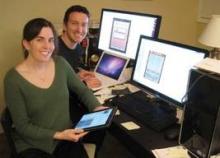Mr. Nawoj’s advice for would-be physician app entrepreneurs? Before you start, clearly define the goals of the application, including potential end users and where they will likely use the technology. Meet with developers, physicians, and any other end users in person to brainstorm. Draw out – literally on a whiteboard – everyone’s expectations for the product. Development of a new app through e-mail and telephone calls is much less time efficient in the end, he said.
The in-person meeting also is important because "a developer’s perspective and a physician’s perspective are going to be very different," Dr. Farrell said.
Be sure what you choose is something you are passionate about, Dr. Farrell said, "because if you’re not, it’s just going to be in the way of other things you’d rather be doing." The ideal situation is to develop a technology you yourself will ultimately use on a daily basis, she said. "That keeps up your motivation and keeps you interested and excited."
Also, solicit ongoing feedback from likely users as the product is further and further refined, added Mr. Nawoj, founder and chief software architect at Beacon Mobile.
Dr. Morris also outlined advice for physicians seeking to develop a health care business idea. "Find someone in your organization to mentor you, someone who has been successful in finding an opportunity and executing their idea."
In addition, realize that the problem you’re trying to solve rarely is a gap in technology alone, Dr. Morris said. More often it’s a "people-process gap," which makes it all the more important to know your stakeholders. "The fact that you’re a doctor is not enough. You can get your blinders on. You may veer off if you don’t have frequent interactions with other clinicians or trusted advisers."
A willingness to take some calculated risk is essential if you’re going to become an entrepreneur, Dr. Morris said. "It’s a little unnerving. This is real money, health care dollars, and a real investment in time."
When he and his colleagues at the Cleveland Clinic decided to develop technology to make the institution’s EMRs make more sense from a user standpoint, they spent "an enormous amount of time developing a business case," he said. They had to prove a demonstrable return on investment that would support development of the new EMR interface.
Dr. Farrell said that for her, and probably for any medical entrepreneur, navigating potential conflict-of-interest issues was a challenge.
"You certainly need to be transparent. This is something my husband’s company has developed, and though I’m specifically not the one receiving the money, that is obviously very close to home. The wife-husband team spoke with the intellectual property personnel at Beth Israel. "Because they fund my salary, [the institution] would be at least able to make an argument that they would own part of the rights to the product as well." The same would be true for any physician developing a product related to the work a hospital is paying them to do, Dr. Farrell said.
"Beth Israel decided that because of all the liability associated with a medical application, and because Apple’s policy is that they do not accept any of the liability [for any applications used on their products], it all falls on the developers." That process took 5 months, Dr. Farrell added, because like Dr. Morris’ interface, the situation was a first for the institution.
Throughout the process, one of the most important things to Dr. Farrell was "to find that balance where I don’t feel like I’m self-promoting and trying to make more money, but at the same time not holding back on something I think would be really useful for everyone."
App’s Profit Measured in Rewards Not Dollars
Bettering medicine aside, what’s the payoff for following the entrepreneurial muse? Measuring a profit can be complicated, says the team behind the Medicine Toolkit app.
"I think it would be hard to define what a ‘profit’ would be. It’s hard to put a price tag on the ‘costs’ that went into making the app, in regards to the amount of our free time we spent developing it, and the ongoing time investment that will be required to keep it updated," says Dr. Farrell.
In a similar vein, her husband, whose software company, Beacon Mobile, developed the app adds: "In general, my business (Beacon Mobile) is a for-profit enterprise ... but when Elizabeth and I partnered together to create the Medicine Toolkit app, the primary goal for this particular product was not around profit but more around helping to make teaching opportunities between med students, residents, and attendings more efficient and effective ... starting with the members of Elizabeth’s team. The fact that others have also shown an interest in the app and found it to be useful in their daily work has been very rewarding for both of us."

